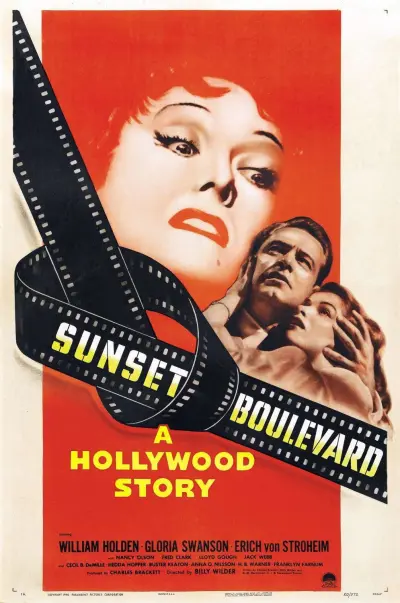
Picture this: you are traversing the serpentine path of Hollywood's dual legacy—where the construction and destruction of dreams occur simultaneously. Here lies our setting when we delve into the realm of the quintessential film noir, Sunset Blvd.. Now, prepare your refreshments, for we embark on a journey through the less glimmering passageways of Tinseltown, a venture truly unmissable.
The narrative, a magnificent web it weaves! We are introduced to Joe Gillis, a screenwriter bereft of luck, marking the inception of our tragic tale. Joe, in the throes of an escape from debt collectors, chances upon the decaying estate of Norma Desmond, a bygone silent film luminary portrayed by the unparalleled Gloria Swanson. Norma's magnificence may have waned, yet her illusions of grandeur and insatiable craving for the limelight still blaze with unrelenting intensity. She ensnares Joe into her illusory realm, where he assumes a multifaceted role: part custodian, part confidant, completely ensnared by her command as he consents to refine her futile screenplay, which she is convinced will restore her former fame.
Director Billy Wilder does not merely narrate a tale; he crafts a somber reflection of the Hollywood dream-manufacturing complex—illuminating the industry's obscured and less illustrious facets. Sunset Blvd. is replete with motifs encompassing the unyielding chase for celebrity, the capriciousness of the entertainment realm, and the desolation associated with becoming obsolete. Audience members witness the unravelling of Norma’s sanity, alongside Joe's ethical tumult, with an encroaching awareness that they are ensnared within the machinery of an entity far exceeding their individual selves.
The residence that Norma occupies evolves into an entity of its own—a tomb to her prior triumphs, crammed with symbols of achievement that now act as her restraints. Within this backdrop unfolds a perverse romance, not between individuals, but between a washed-up icon and the reflection of her former self. Norma's engagement with her past accolades is both a love affair and a tale of terror, culminating in her eerie final appearance—"I'm ready for my close-up, Mr. DeMille."
Our protagonist Joe is far from a passive observer. He is lured—not solely by Norma but by the indulgent lifestyle her insanity affords him. Vacillating between ethical decisions and the allure of ease, he exemplifies the moral concessions routinely made in the quest for prosperity. However, as Norma’s circumstances grow increasingly harrowing, Joe's immersion in her delusion turns lethal—a grim admonition of the hazards inherent in mistaking Hollywood's lustrous facade for its truth.
In the pantheon of American cinema, Sunset Blvd. is an enduring monument to the potency of narrative—and an admonitory narrative about the pitfalls of pride and wistfulness. This film transcends mere storytelling; it lays bare the spectres of Hollywood's halcyon days, meandering down the Boulevard of Broken Dreams, murmuring of the transitory essence of fame. And still, after decades, it reflects on an industry capable of exalting individuals to divinity, yet also dooming them to obscurity with the mere dimming of a projector's beam. It reveals that within Hollywood, occasionally the most enthralling stories are those that unfold off-camera.
The narrative, a magnificent web it weaves! We are introduced to Joe Gillis, a screenwriter bereft of luck, marking the inception of our tragic tale. Joe, in the throes of an escape from debt collectors, chances upon the decaying estate of Norma Desmond, a bygone silent film luminary portrayed by the unparalleled Gloria Swanson. Norma's magnificence may have waned, yet her illusions of grandeur and insatiable craving for the limelight still blaze with unrelenting intensity. She ensnares Joe into her illusory realm, where he assumes a multifaceted role: part custodian, part confidant, completely ensnared by her command as he consents to refine her futile screenplay, which she is convinced will restore her former fame.
Director Billy Wilder does not merely narrate a tale; he crafts a somber reflection of the Hollywood dream-manufacturing complex—illuminating the industry's obscured and less illustrious facets. Sunset Blvd. is replete with motifs encompassing the unyielding chase for celebrity, the capriciousness of the entertainment realm, and the desolation associated with becoming obsolete. Audience members witness the unravelling of Norma’s sanity, alongside Joe's ethical tumult, with an encroaching awareness that they are ensnared within the machinery of an entity far exceeding their individual selves.
The residence that Norma occupies evolves into an entity of its own—a tomb to her prior triumphs, crammed with symbols of achievement that now act as her restraints. Within this backdrop unfolds a perverse romance, not between individuals, but between a washed-up icon and the reflection of her former self. Norma's engagement with her past accolades is both a love affair and a tale of terror, culminating in her eerie final appearance—"I'm ready for my close-up, Mr. DeMille."
Our protagonist Joe is far from a passive observer. He is lured—not solely by Norma but by the indulgent lifestyle her insanity affords him. Vacillating between ethical decisions and the allure of ease, he exemplifies the moral concessions routinely made in the quest for prosperity. However, as Norma’s circumstances grow increasingly harrowing, Joe's immersion in her delusion turns lethal—a grim admonition of the hazards inherent in mistaking Hollywood's lustrous facade for its truth.
In the pantheon of American cinema, Sunset Blvd. is an enduring monument to the potency of narrative—and an admonitory narrative about the pitfalls of pride and wistfulness. This film transcends mere storytelling; it lays bare the spectres of Hollywood's halcyon days, meandering down the Boulevard of Broken Dreams, murmuring of the transitory essence of fame. And still, after decades, it reflects on an industry capable of exalting individuals to divinity, yet also dooming them to obscurity with the mere dimming of a projector's beam. It reveals that within Hollywood, occasionally the most enthralling stories are those that unfold off-camera.


